
December 1, 1955: Rosa Parks refuses to give up her seat to a white passenger on a Montgomery, Alabama bus. November 6, 2012: Barack Obama is reelected to the Presidency of the United States. What a difference 57 years make!
November 6, 2012 happens also to have been the Opening Night of the National Tour of Memphis, the Tony-winning Best Musical set in the same decade Rosa Parks made her historic stand for racial equality, a serendipitous coincidence given that Memphis is the fictional but fact-inspired tale of Huey Calhoun, a Memphis DJ who made history in his own way by daring to play “race music” on mainstream, i.e. white radio. That particularly groundbreaking step, and Calhoun’s then illegal romance with a young singer he meets on his first visit to a “colored” nightclub, are at the heart of one of the most powerful—and most tuneful and exuberant—musicals Broadway has seen in many a year.
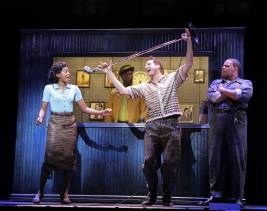 Bryan Fenkart heads the touring cast as Huey, whose excitement at discovering “the music of my soul” leads him from a short-lived job selling rock ‘n’ roll records at a local department store to becoming Memphis’s most popular radio DJ in record time, with some interracial falling in love along the way.
Bryan Fenkart heads the touring cast as Huey, whose excitement at discovering “the music of my soul” leads him from a short-lived job selling rock ‘n’ roll records at a local department store to becoming Memphis’s most popular radio DJ in record time, with some interracial falling in love along the way.
The object of Huey’s complete devotion is aspiring R&B songstress Felicia Farrell (Felicia Boswell), whose brother Delray (Horace V. Rogers) runs the nightclub where Huey discovers both soul music and soul mate. Not surprisingly, Delray is ill-inclined to see his sister involved with a man of the opposite color, nor is Huey’s mother Gladys (Julie Johnson) any less displeased, but Huey is as blind to her disapproval as he is to Felicia’s race. Before long, the couple are lovers, forced to meet in secret by a society in which a single kiss, if seen by the wrong people, could lead to a bashing, and quite possibly worse.
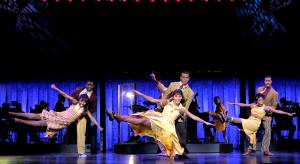 Even without David Bryan’s infectious Tony-winning songs and Sergio Trujillo’s show-stopping choreography, Memphis would make for a compelling period drama. With them, it is elevated to the status of instant musical theater classic, one which entertains, moves, and educates, with a definite emphasis on the former, thanks to Joe DiPietro’s Tony-winning book and even more particularly to Christopher Ashley’s pizzazzy yet nuanced direction.
Even without David Bryan’s infectious Tony-winning songs and Sergio Trujillo’s show-stopping choreography, Memphis would make for a compelling period drama. With them, it is elevated to the status of instant musical theater classic, one which entertains, moves, and educates, with a definite emphasis on the former, thanks to Joe DiPietro’s Tony-winning book and even more particularly to Christopher Ashley’s pizzazzy yet nuanced direction.
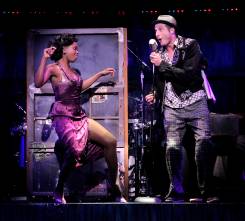 As Huey (loosely based on real-life Memphis DJ Dewey Phillips), Fenkart gives the kind of exciting, uninhibited, engaging, joyous, stand-up-and-cheer performance that turns unknowns into stars. Boswell does gutsy, gorgeous work as Felicia, with a voice just begging for its own CD. Rogers is a dynamic Delray, who opens the show with a soulful “Underground,” and the same can be said for Will Mann’s Bobby (the radio station janitor who gets his own great big showstopper “Big Love”), and Rhett George as Gator, mute since his father’s lynching, who finds his voice in the stirring Act One finale “Say A Prayer.” William Parry makes for a fine and feisty Mr. Simmons (the radio station owner who gives Huey his big break), and as for Johnson, there aren’t enough superlatives for her scene-stealing Gladys with a voice to shatter a Phantom chandelier.
As Huey (loosely based on real-life Memphis DJ Dewey Phillips), Fenkart gives the kind of exciting, uninhibited, engaging, joyous, stand-up-and-cheer performance that turns unknowns into stars. Boswell does gutsy, gorgeous work as Felicia, with a voice just begging for its own CD. Rogers is a dynamic Delray, who opens the show with a soulful “Underground,” and the same can be said for Will Mann’s Bobby (the radio station janitor who gets his own great big showstopper “Big Love”), and Rhett George as Gator, mute since his father’s lynching, who finds his voice in the stirring Act One finale “Say A Prayer.” William Parry makes for a fine and feisty Mr. Simmons (the radio station owner who gives Huey his big break), and as for Johnson, there aren’t enough superlatives for her scene-stealing Gladys with a voice to shatter a Phantom chandelier.
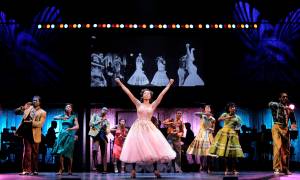 Ensemble members Alexander Aguilar, Angela Brydon (Teenager), Whitney Leigh Brown, Tami Dahbura (Clara, White Mother), Lynorris Evans (Black DJ, Be Black Trio), Kelcy Griffin (“Someday” Backup Singer), Christopher Gurr (White DJ, Mr. Collins, White Father, Gordon Grant), Adrienne Howard, Jarvis D. Mckinley (Be Black Trio), Jill Morrison, Kent Overshown (Wailin’ Joe, Reverend Hobson), Austin Owen (Perry Como, Frank Dryer), Justin Prescott (Be Black Trio), Lindsay Roberts (“Someday” Backup Singer), Naimah Saleem (“Someday” Backup Singer, Ethel), Jack Sippel, Peter and Matthew Smith (Buck Wiley, Martin Holton) prove themselves quintessential triple-threats in a variety of high energy song-and-dance roles, with special mention due bubbly Orange County native Morrison, performing for the first time on the Segerstrom Center stage. Swings Bree Branker, (dance captain) Kyle Leland, (assistant dance captain) Kenna Michelle Morris, Jody Reynard, and Derek St. Pierre may appear at certain performances.
Ensemble members Alexander Aguilar, Angela Brydon (Teenager), Whitney Leigh Brown, Tami Dahbura (Clara, White Mother), Lynorris Evans (Black DJ, Be Black Trio), Kelcy Griffin (“Someday” Backup Singer), Christopher Gurr (White DJ, Mr. Collins, White Father, Gordon Grant), Adrienne Howard, Jarvis D. Mckinley (Be Black Trio), Jill Morrison, Kent Overshown (Wailin’ Joe, Reverend Hobson), Austin Owen (Perry Como, Frank Dryer), Justin Prescott (Be Black Trio), Lindsay Roberts (“Someday” Backup Singer), Naimah Saleem (“Someday” Backup Singer, Ethel), Jack Sippel, Peter and Matthew Smith (Buck Wiley, Martin Holton) prove themselves quintessential triple-threats in a variety of high energy song-and-dance roles, with special mention due bubbly Orange County native Morrison, performing for the first time on the Segerstrom Center stage. Swings Bree Branker, (dance captain) Kyle Leland, (assistant dance captain) Kenna Michelle Morris, Jody Reynard, and Derek St. Pierre may appear at certain performances.
SoCal musical director Darryl Archibald extraordinaire plays keyboards while conducting the production’s thrilling Memphis band. David Gallo’s spectaular set design, Paul Tazewell’s Tony-nominated period costumes, Howell Binkley’s dazzling lighting, and Ken Travis’s crystal clear sound design are precisely what you’d expect from a top-tier Broadway tour, with additional kudos due Gallo and Shawn Sagady for their projection design, Charles G. LaPointe for his hair and wig design, and Steve Rankin for his fight direction. Adam Arian is associate director and Edgar Godineaux associate choreographer. Anna R. Kaltenbach is production stage manager.
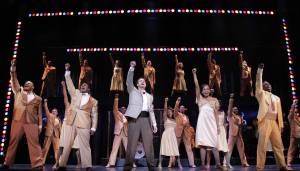 Just as the November 6 election makes it abundantly clear how far we’ve come, Memphis makes it equally clear how deeply in need of change things were slightly over half a century ago, and does so in the most thrilling and entertaining way imaginable. You’ll be wanting to book your ticket to Memphis asap. It’s cheaper than an airplane ticket down South and a whole lot more fun.
Just as the November 6 election makes it abundantly clear how far we’ve come, Memphis makes it equally clear how deeply in need of change things were slightly over half a century ago, and does so in the most thrilling and entertaining way imaginable. You’ll be wanting to book your ticket to Memphis asap. It’s cheaper than an airplane ticket down South and a whole lot more fun.
Segerstrom Center For The Arts, 600 Town Center Drive, Costa Mesa.
www.scfta.org
–Steven Stanley
November 6, 2012
Photos: Paul Kolnik


 Since 2007, Steven Stanley's StageSceneLA.com has spotlighted the best in Southern California theater via reviews, interviews, and its annual StageSceneLA Scenies.
Since 2007, Steven Stanley's StageSceneLA.com has spotlighted the best in Southern California theater via reviews, interviews, and its annual StageSceneLA Scenies.







 COPYRIGHT 2024 STEVEN STANLEY :: DESIGN BY
COPYRIGHT 2024 STEVEN STANLEY :: DESIGN BY